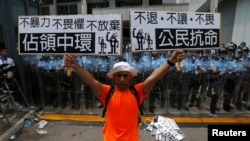A dispute over how Hong Kong residents should elect their local leader escalated on Saturday after pro-democracy student protesters forced their way into the port city’s government headquarters.
While police have arrested dozens of people and used pepper spray in an attempt to suppress the protests, many are coming out to join the students in a show of support.
Police have said they must disperse in a matter of hours.
Hong Kong television broadcasts of the police crackdown at Hong Kong’s government offices showed officers dragging and carrying away dozens of protesters — and in some cases tossing them aside violently.
Hundreds of protesters forced their way into government headquarters late Friday and authorities responded with force.
In scenes of the confrontation broadcast by Hong Kong’s TVB, riot police ripped umbrellas from the protesters’ hands as they tried to protect themselves from pepper spray. Scores were seen dousing their eyes and faces with water afterwards.
Police say at least 29 people were injured and 61 arrested near the government compound since late Friday. Outside the grounds, which are not far from the port city’s financial district, a large crowd of students chanted at police and demanded that they stop the arrests.
Student protester Mocha Lau says no one should be deterred by the government’s response.
Despite the pepper spray, Lau says she thinks protesters should not run from police, saying democracy is something you have to fight for and that sacrifices are necessary.
Students in Hong Kong have been boycotting classes all week to demand that China allow full democratic elections in 2017.
When Hong Kong was returned to Chinese rule in 1997, the territory was guaranteed a high degree of autonomy and freedom under a form of rule that is called “one country, two systems.” Residents in Hong Kong already enjoy freedoms that do not exist in China, but many feel the situation is eroding. China ruled last month that all candidates for election as Hong Kong’s leader in 2017 must be pre-approved by a pro-Beijing committee.
After that decision, pro-democracy activists in Hong Kong said they will shut down the city's financial district in a so-called "Occupy Central with Love and Peace" campaign set to begin on Wednesday, October 1, China’s National Day.
Students at Saturday's rally said demonstrations in the financial district should begin now. "Occupy Central" co-founder Benny Tai initially had hesitated, but in the early hours Sunday morning announced that the campaign to block the financial heart of the city had begun.
"We will stand with you [students] together. And we will stay here till the last minute with you together," Tai said Saturday as he joined the students at government headquarters.
In China, Internet censors were busy scrubbing social media sites such as Weibo of any mention of the protests. Many of the postings that were taken down voiced support for the students and disgust with the way police moved in to crack down on the gathering of protesters, some of them teenagers.
Chinese state media were eerily silent on developments in the port city, except for a story about President Xi Jinping’s remarks to a visiting group from Taiwan Friday. In the remarks, Xi said China’s stance on unification with the self-ruled island is “firm and unwavering.”
Reports also highlighted China’s position that the “one country two systems” model was the best path for Taiwan.












